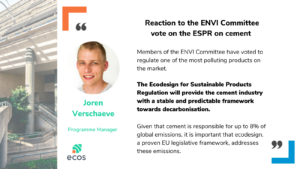Polluting cement finally under pressure to reduce emissions – MEPs must stand strong
Today, the European Parliament’s ENVI Committee voted to speed up decarbonisation by introducing requirements that would cover the environmental impact of cement in the proposed Ecodesign for Sustainable Products Regulation (ESPR)[1].

Cement is responsible for up to 8% of global emissions – and demand is growing. But the sector is not decarbonising fast enough to meet Europe’s climate ambitions.
Regulating the environmental performance of the energy intensive cement industry cannot be avoided. The extent of its emissions in the face of the escalating climate emergency requires urgent action – but progress has been much too slow, despite there being low-carbon solutions ready to enter the market at scale today [2].
Until now, cement has been largely self-regulated, with industry dominating the standardisation process that underpins the Construction Products Regulation (CPR) – the most important piece of legislation regulating the sector to date. This has left the CPR too weak to guide any shift towards decarbonisation. ESPR should now offer a backstop if the CPR is not successfully regulating cement’s environmental performance in the short term.
The Ecodesign Directive has successfully reduced the emissions of a wide variety of products since its entry into force in 2009. Bringing cement under the ecodesign umbrella will ensure this polluting product finally aligns with the ambitions of the European Green Deal and the EU’s target of climate neutrality by 2050.
We urge Members of the European Parliament to support the ENVI Committee’s position in plenary and vote for Europe’s green future. We cannot afford for such a step to be delayed any longer.
Joren Verschaeve, Programme Manager at ECOS – Environmental Coalition on Standards, said:
“Members of the ENVI Committee have voted to regulate one of the most polluting products on the market. The Ecodesign for Sustainable Products Regulation will provide the cement industry with a stable and predictable framework towards decarbonisation. Given that cement is responsible for up to 8% of global emissions, it is important that ecodesign, a proven EU legislative framework, addresses these emissions.”

Notes to editors
[1] European Commission’s Ecodesign for Sustainable Products Regulation (ESPR) proposal.
[2] Alliance for Low-Carbon Cement & Concrete report – Fast-tracking Cement Decarbonisation.
Today🗞️| @EP_Environment voted to speed up #decarbonisation
“The ESPR will provide the cement industry with a stable & predictable framework towards decarbonisation” – @JorenVerschaeve, ECOS Programme Manager
👉https://t.co/hl25S1EWdb https://t.co/5BCBbWaGzo pic.twitter.com/G0Nyzo2l5K
— ECOS 🌳 (@ECOS_Standard) June 15, 2023
Contact
If you have questions, please get in touch with me:
Alison Grace – Press & Communications Manager at ECOS
alison.grace@ecostandard.org | +32 493 19 22 59
ECOS – Environmental Coalition on Standards is an international NGO with a network of members and experts advocating for environmentally friendly technical standards, policies, and laws.


